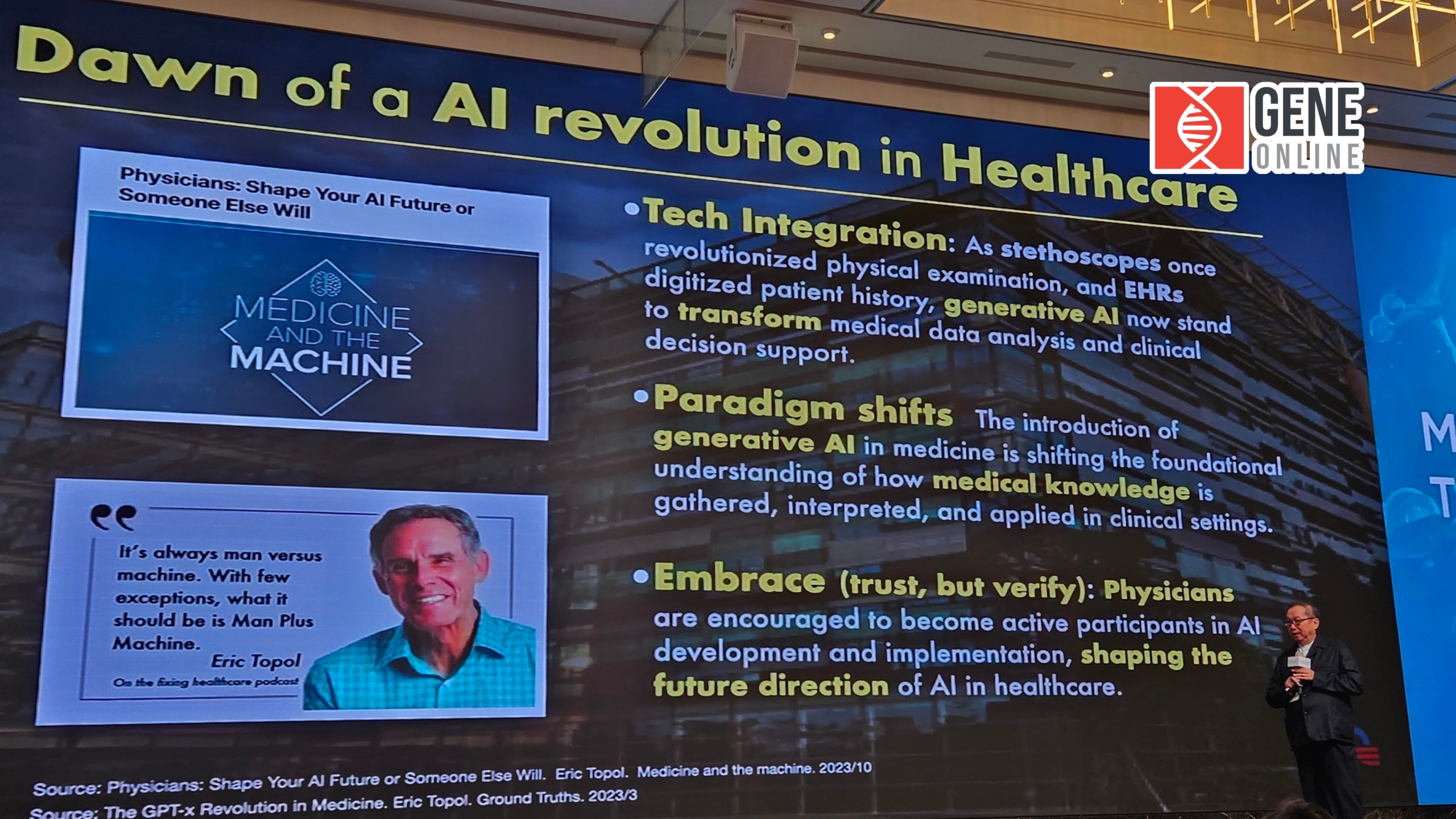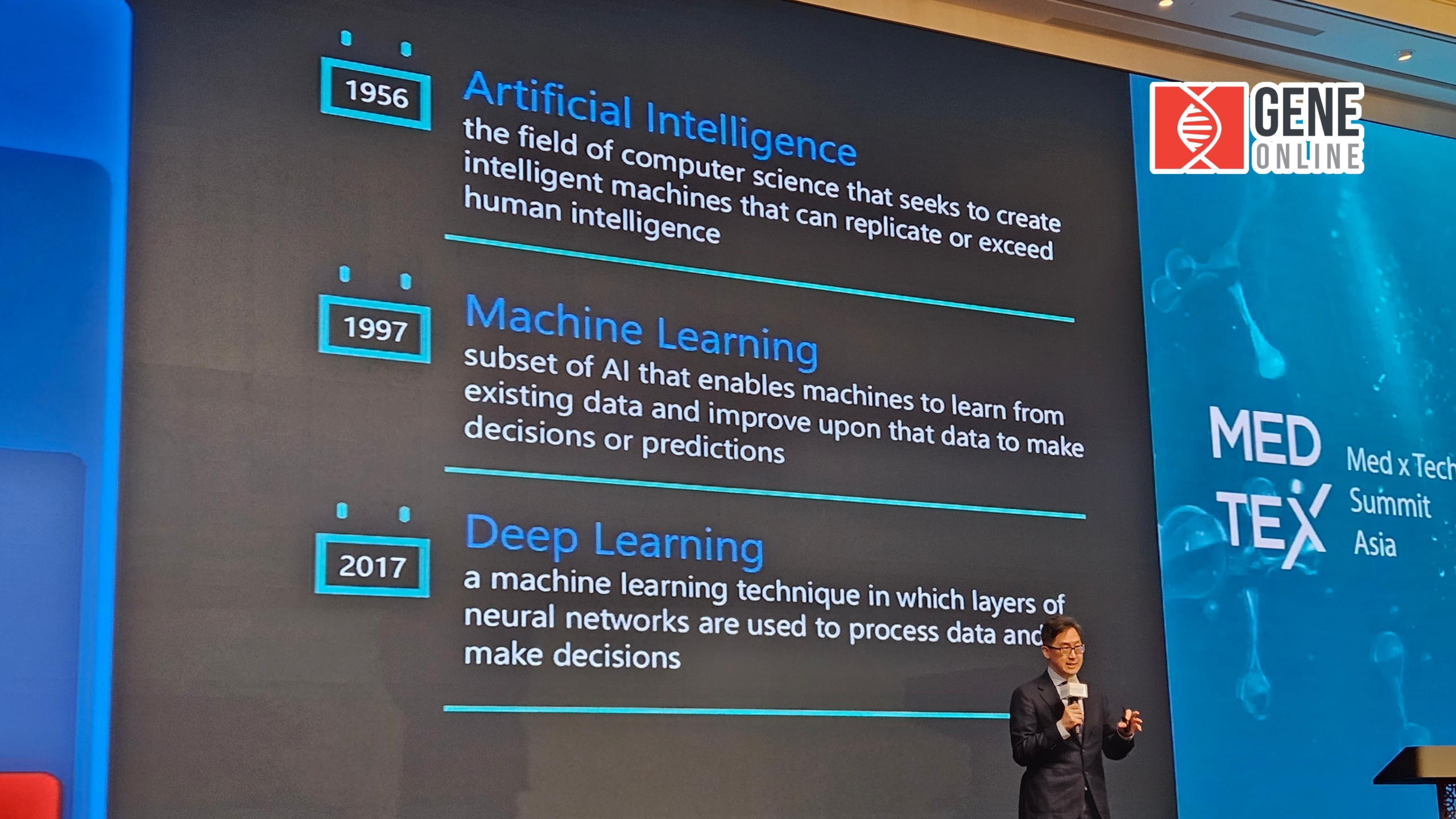MedTex Summit Asia 2023: Embracing the Dawn of a New Generation of Medical AI
The sixth edition of the Med x Tech (MedTex) Summit Asia, co-organized by the Institute for Biotechnology and Medicine Industry (IBMI), the Research Center for Biotechnology and Medicine Policy, and the International Medical Informatics Association, and advised by the National Science and Technology Council (NSTC), was grandly held in Taipei on November 30. As one of the main events of the Healthcare+ Expo Taiwan 2023, the summit centered on the theme of “Innovation in AI: The Future of Healthcare”, featuring biotech and medical professionals and representatives from global technology giants. The event also highlighted new trends in the smart healthcare industry across the globe in terms of software innovations, hardware advancements, and practical applications.
In her opening speech, Yi-Juang Chern, Deputy Minister of the NSTC, expressed her commitment to support more potential medical technology projects in the future, and to promote inter-hospital validation of smart medical devices as well as the licensing of these devices for domestic and international marketing, thereby creating demonstration sites for leading-edge smart hospitals in Taiwan and fostering the development of the precision health industry. Through public-private partnerships between the government and the private sector, it is hoped that Taiwan’s niche biotechnology and medical technologies can be exported to the international arena.
Related article: MedTex Summit Asia 2022: Revolutionizing Smart Healthcare with Next Generation Technologies
Navigating the New Wave of Generative AI
Barry Lam, Chairman of Quanta Computer and Vice President of the IBMI, delivered a keynote speech on “How AI revolutionizes global healthcare today and in the future?”. He began his speech by reviewing the development of AI, from the early-stage AI in the 1980s and 1990s with limited applications, to the emergence of discriminative AI in 2012 to 2022, which focuses on single or narrow tasks, and the wave of generative AI from 2022 onwards, resulting in increasingly multimodal AI models with more extensive, versatile, and feature-rich applications.
Barry Lam noted that as humanity is at the dawn of a new era of AI, the computing costs are likely to come down dramatically, while the computing power will increase even further. Given the fact that about 70 to 80% of the world’s AI servers are made in Taiwan, the island is in a unique position to capitalize on the new wave of AI thanks to its tremendous advantage in hardware and the supply chain, he added.
When it comes to the medical application of AI, Barry Lam reckoned that generative AI has considerable development potential in the medical industry. He indicated that many physicians are aware of the existence of clinical AI tools, but only about 10% to 30% of them have actually been using them. He expressed his confidence that AI would function more like a real physician in the future with extensive training in analyzing images and data, which would help improve the efficiency of clinical practice. In terms of clinical trials, researchers may leverage generative AI to create synthetic control arms (SCAs) based on data from real subjects. The database has already accumulated data from over 20 years of experience, encompassing about 30,000 trials with over 9 million anonymized patient records, which could be used to improve the efficiency of experiments and shorten the time required for drug development.
Revolutionizing the Global Healthcare Landscape with Multimodal Medical AI
Tech giants such as Microsoft and Google have been taking the lead in this healthcare AI revolution. For example, Microsoft acquired Nuance, a leader in conversational AI and ambient intelligence, in 2022 to integrate its AI solutions with Microsoft’s technology to facilitate the handling of massive clinical data in hospitals. Besides, Microsoft has also expanded its strategic partnership with healthcare software company Epic Systems, which utilizes Epic’s industry-leading electronic health record software with generative AI to quickly generate electronic medical records.
Meanwhile, Google boasts two multimodal medical AI systems, ELIXR and Med-PaLM M. The former can be used to quickly interpret chest X-ray images, while the latter can integrate a patient’s electronic health record, medical images, and genomic data to support physicians in their clinical interventions. In addition, both companies have already established partnerships with some of the world’s leading healthcare organizations, intending to combine technology and medical knowledge to create a generative AI ecosystem in health and human services.
Nevertheless, Barry Lam also acknowledged that the development of medical generative AI carries considerable risks. Taking chest X-ray images as an example, there are still cases of misjudgment, and thus he envisaged that AI would not simply replace medical professionals, but rather assist them in making better professional decisions and that human verification would still be indispensable.
Overall, Barry Lam is optimistic about the use of AI in the biotech and healthcare industries, saying that generative AI could bring about a “paradigm shift” that would revolutionize the way medical information is gathered, interpreted and applied in clinical settings. He urged healthcare professionals to embrace this new wave, to trust the judgment of AI in clinical practice with verification, and to actively participate in the development and implementation of medical AI.

Advancements and Breakthroughs of Medical AI
David Rhew, Microsoft’s Global Chief Medical Officer & VP of Healthcare, gave a keynote speech on “AI Medical Advancements and Breakthroughs: Beyond ChatGPT”, mentioning that Microsoft Azure is one of the top three public cloud service platforms (the other two are Amazon Web Services and Google Cloud Platform), and the only provider that has set up a dedicated healthcare team in Taiwan. Over the past two years, Microsoft Azure has been deeply engaged in Taiwan’s medical centers and major regional hospitals, with more than 70% of medical centers currently adopting Microsoft’s Office 365 Teams + Power Platform and other healthcare collaboration tools, and more than half of them have successfully developed and deployed Azure OpenAI ChatGPT technology, leveraging generative AI to optimize the time-consuming and labor-intensive operations of healthcare practitioners.
During his speech, he also highlighted some of the exciting applications of AI in the medical field. Taking cancer treatment as an example, Microsoft is developing a clinical trial matching system, which aims to match patients with potentially suitable clinical trials, and can also help researchers find suitable participants. In terms of mental health, thanks to machine-learning speech analytics, physicians can understand patients’ stress levels and emotional states, and monitor the severity of their anxiety or depression symptoms, enabling early intervention, lowering healthcare costs, and expanding remote patient monitoring solutions.
David Rhew also pointed out that the emergence of medical AI could transform the model of nursing care “from reactive care to proactive care”, which is no longer confined to responding only when patients’ conditions deteriorate, but rather to preventing predictable adverse events, as well as detecting and averting possible deterioration of patients’ conditions at an early stage.
Establishing Trustworthy AI in Healthcare
At the end of his speech, David Rhew mentioned a multi-sectoral international organization called the Coalition for Health AI (CHAI), which gathers medical professionals, scholars, expert practitioners of artificial intelligence (AI) and data science, as well as representatives from regulatory agencies, to make healthcare AI tools safer, more useful and more reliable, while solving issues in fairness, transparency and information security. CHAI aims to establish “Responsible AI Guardrails” to regulate algorithmic tools and provide guidance and guidelines for those developing and using medical AI systems to monitor and evaluate the performance of such applications.












